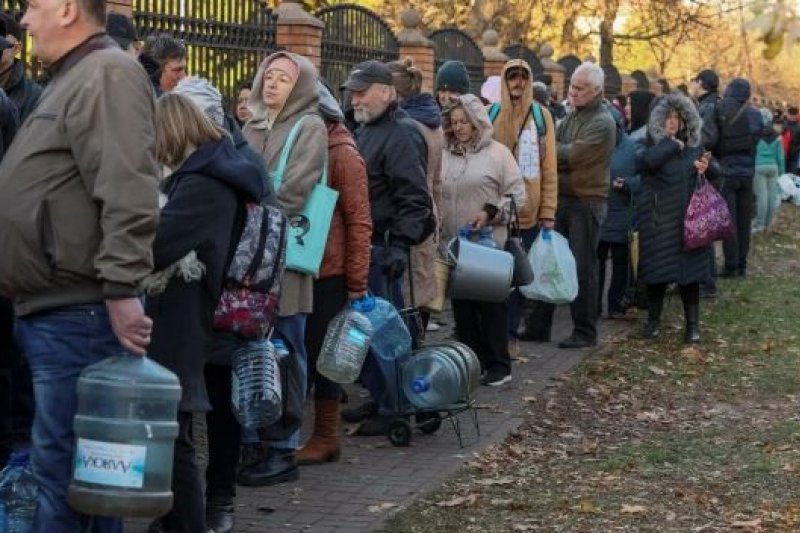Kyiv Preparing for Possibility of Nuclear Attack
Residents in Kyiv are actively preparing for the once-unthinkable possibility of a nuclear attack, with many believing it is now a matter of when, not if, Putin decides to strike.
Table talk in bars and restaurants now drift to speculation over which city would make the most likely target and what type of weapon would be used.
Many, like Dmytro Bondarenko, are stocking up on supplies and making survival plans. Nearly every inch of free space in his apartment is now filled with non-perishable food and water.
There are rolls of packing tape to seal the windows from radioactive fallout along with fuel canisters and spare tyres next to the washing machine in case he needs to leave the country in a hurry.
The app designer, 33, said he can’t be sure he would be safe from a Russian nuclear strike but believes it’s better to be prepared because ‘they’re crazy’.
Mykhailo Podolyak, an advisor to President Volodymyr Zelensky, told the Associated Press: ‘Of course Ukraine takes this threat seriously, because we understand what kind of country we are dealing with.’
The Kremlin has made unsubstantiated claims that Ukraine is preparing a ‘dirty bomb’ in Russian-occupied areas.
Kyiv strenuously denies it and has said such statements are more likely a sign that Moscow is itself preparing such a weapon and laying the ground to blame it on Ukraine.
Fears of a nuclear strike trigger painful memories among those who lived through the Chernobyl disaster, when one of the reactors exploded releasing a plume of radiation.
The accident was initially covered up by the Soviet authorities and while the small town close to the plant was evacuated, Kyiv – 60 miles south – was not.
Svitlana Bozhko, then a 26-year-old journalist, was seven months pregnant at the time and believed all the official statements playing it down.
It was only after her husband spoke to a physicist and they saw those fleeing the capital rinsing the tyres of their cars that they decided to leave.
But the fears stayed with her throughout her pregnancy. When her daughter was finally born, her first question was: ‘How many fingers does my child have?’
That daughter, thankfully born in good health, now has a one-year-old child of her own. They fled the capital a month after Russia invaded.
Ms Bozhko, now, 62, still lives in Kyiv and had hoped she would never have to go through something like that again. But Vladimir Putin’s brutal war in the country has brought those fears flooding back.
She told AP: ‘It was déjà vu. Once again, the feelings of tragedy and helplessness overwhelmed me.’
Roman Tkachuk, head of Kyiv’s Municipal Security Department, said more than 1,000 personnel are on hand to respond to any potential release of radioactive material.
He added that officials have purchased huge numbers of potassium iodide pills and protective equipment to be handed out to residents.
Websites offer tips for surviving a dirty bomb while TikTok has multiple posts of people packing ‘nuclear luggage’ to make a quick getaway and offering advice on what to do in case of a nuclear attack.
October saw ‘huge spikes’ of Ukrainian visits to NUKEMAP, a website that allows users to simulate an atomic bomb dropped on a given location, according to its creator, Alex Wellerstein.
Others have turned to dark humour to cope with the stress.
More than 8,000 people joined a chat on the Telegram messaging service after a tweeted joke that in case of a nuclear strike, survivors should go to Kyiv’s Schekavytsia Hill for an orgy.
On the serious side, mental health experts say having a support network is key to remaining resilient during uncertain times.
‘That’s often the case in Ukraine and also you need to have the feeling that you can cope with this. And there is this group feeling (that is) quite strong,’ said Dr, Koen Sevenants, lead for mental health and psychosocial support for global child protection for UNICEF.
However, he said extended periods under threat can lead to a sense of helplessness, hopelessness and depression.
In Kyiv, Ms Bozhko feels that same fatigue.
She has learned what to do in case a missile hits, keeps a supply of remedies for various kinds of chemical attacks, and has what she calls her ‘anxiety luggage’ — essentials packed in case of sudden evacuation.
‘I’m so tired of being scared; I just keep living my life,’ she says, adding: ‘But if something happens, we will try to fight and survive.’
And she said she understands the difference between 1986 and 2022, the Metro reported.
‘Back then, we were afraid of the power of atoms, she said. ‘
‘This time, we face a situation when a person wants to exterminate you by any means, and the second is much more terrifying.’













